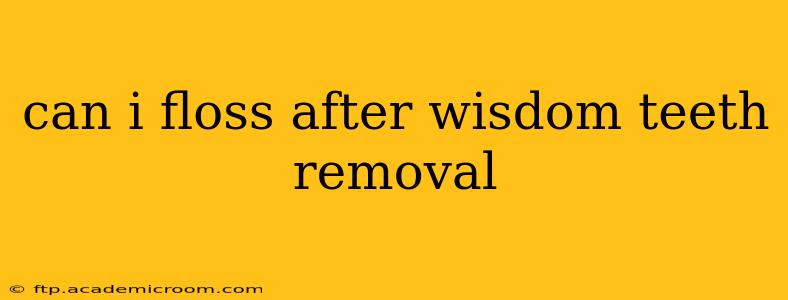Can I Floss After Wisdom Teeth Removal? A Comprehensive Guide
The simple answer is no, you shouldn't floss after wisdom teeth removal. At least, not immediately. Flossing after wisdom teeth extraction can disrupt the delicate blood clot forming in the extraction site, leading to a painful and potentially serious complication called dry socket. However, the specifics depend on your individual situation and your oral surgeon's instructions.
This guide will cover everything you need to know about oral hygiene after wisdom teeth removal, including flossing. We'll address common questions and concerns to provide you with the best possible post-operative care.
What is Dry Socket and Why Should I Avoid Flossing?
Dry socket (alveolar osteitis) occurs when the blood clot protecting the extraction site becomes dislodged or dissolves prematurely. This exposes the underlying bone and nerve endings, causing intense pain, bad breath, and a sometimes foul-smelling discharge. Flossing, especially near the extraction site, significantly increases your risk of dislodging this crucial blood clot.
The force of the floss, even gentle flossing, can easily disturb the healing process. This risk remains for several crucial days following the procedure.
When Can I Resume Flossing After Wisdom Teeth Removal?
The timing of when you can resume flossing depends entirely on your healing progress and your oral surgeon's recommendations. Never start flossing again before receiving the all-clear from your dentist or oral surgeon. This typically happens after a week or more, once the extraction sites have started to heal significantly. Even then, you'll likely want to avoid flossing directly on the extraction sites for a longer period.
What About Brushing After Wisdom Teeth Removal?
Unlike flossing, gentle brushing is usually permitted within 24 hours of wisdom teeth removal. However, you should be extremely careful to avoid brushing directly over the extraction sites. Focus on brushing the rest of your teeth gently and rinsing thoroughly with the prescribed mouthwash.
What Should I Use Instead of Flossing After Wisdom Teeth Removal?
In the days following surgery, you can maintain good oral hygiene by:
- Rinsing with salt water: This is a great way to cleanse the mouth and promote healing. Mix a half-teaspoon of salt in a cup of warm water and gently rinse several times a day.
- Using a prescribed mouthwash: Your oral surgeon will likely provide you with a special antiseptic mouthwash to help prevent infection and promote healing. Follow their instructions carefully.
- Focusing on brushing areas away from the extraction sites: Clean the teeth adjacent to the removed wisdom teeth carefully, but avoid the sockets themselves.
How Long Does It Take to Fully Recover From Wisdom Teeth Removal?
Full recovery from wisdom teeth removal varies from person to person, but it generally takes several weeks. The initial healing phase, during which you should avoid flossing, usually lasts around a week, but complete healing can take several more weeks.
What Are the Signs of Dry Socket?
If you experience any of the following symptoms, contact your dentist or oral surgeon immediately:
- Severe, persistent pain in the extraction site
- Bad breath or a foul taste in your mouth
- Visible bone in the extraction site
- A persistent throbbing sensation
- Delayed healing
Following your oral surgeon's post-operative instructions diligently is key to a smooth recovery and minimizing the risk of complications like dry socket. Patience and gentle care are vital during this healing process. Always consult your dentist or oral surgeon with any questions or concerns you may have. They can provide personalized advice based on your specific situation.
